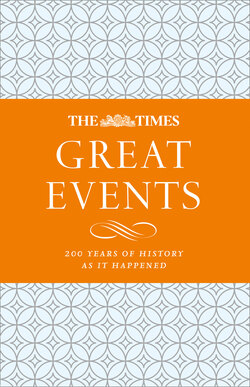Читать книгу The Times Great Events - Группа авторов - Страница 34
ОглавлениеTHE TRIALS OF OSCAR WILDE
27 May 1895
The question which the jury had to decide was whether [Oscar] Wilde was guilty of the charge made against him. His Lordship reviewed the evidence which had been given in the case, and pointed out to the jury the questions for their consideration. There was only evidence as to one of the counts in reference to St James’s-place.
The jury retired to consider their verdict at half-past 3 o’clock, and at 26 minutes past 5 o’clock they returned and asked a question in reference to the evidence as to St. James’s-place.
MR. JUSTICE WILLS read his note of the evidence of a witness on the subject, and the jury retired again, but returned into Court about five minutes afterwards and said they found Wilde Guilty on all the counts except that which charged him in respect to Edward Shelley, upon which they found him Not guilty. That count, it will be remembered, was withdrawn from the jury by Mr. Justice Wills on Thursday.
The announcement of the verdict was greeted with a cry of “Shame” in a portion of the Court reserved for the public.
The defendant Taylor was then placed in the dock.
SIR EDWARD CLARKE asked Mr. Justice Wills not to pass sentence until next sessions, as there was a demurrer [objection] to be argued in reference to the indictment.
Mr. J. P. GRAIN, who appeared for the defendant Taylor, said that the argument of the demurrer would affect Taylor equally, and he therefore made the same application as Sir Edward Clarke.
The SOLICITOR-GENERAL opposed the application. The passing of sentence now would not interfere with the argument of the demurrer.
MR. JUSTICE WILLS. – There was a verdict of “not guilty”.
SIR EDWARD CLARKE. – That does not affect it.
MR. JUSTICE WILLS. – What is the objection?
SIR EDWARD CLARKE. – That the indictment is bad?
MR. JUSTICE WILLS. – What is the point?
SIR EDWARID CLARKE. – The point is the joining of two sets of counts on one set of which the defendants could be called as witnesses and on the other could not.
MR. JUSTICE WILLS said that, as the passing of sentence now would not affect the argument of the demurrer, he thought it his duty to complete the proceedings here.
MR. JUSTICE WILLS, addressing Wilde and Taylor, said that it had never been his lot to try a case of this kind so bad. One had to put stern constraint upon oneself to prevent oneself from describing in language which he would rather not use the sentiments which must rise in the breast of every man who had any spark of decent feeling in him and who had heard the details of these two terrible trials. He could not do anything except pass the severest sentence which the law allowed, and in his judgment it, was totally inadequate to such a case as this. The sentence was that each of them be imprisoned and kept to hard labour for two years.
On the sentence being pronounced there were cries of “Shame” and hisses in Court.
In 1895, Oscar Wilde was at the peak of his fame as a writer and playwright; The Importance of Being Earnest opened in London in February that year. He was almost as well-known for his aesthetic ideas and willingness to flout convention. This extended to his private life, for although he was married, Wilde was also homosexual and at the time (and until 1967) sexual acts between men were treated as crimes.
When the Marquess of Queensberry, the father of Wilde’s lover Lord Alfred Douglas, accused him publicly of sodomy, Wilde prosecuted him for libel. Since there was ample evidence that the Marquess’s allegation was true, this proved disastrous for Wilde, who in April 1895 lost the case and was bankrupted by having to pay his adversary’s costs.
He was then arrested a few days later on charges of gross indecency. The jury at a first trial could not reach a verdict, but at a second Wilde and his friend Alfred Taylor were convicted. After his release from Reading Gaol in 1897, Wilde sailed to France, where he died three years later, aged 46.
